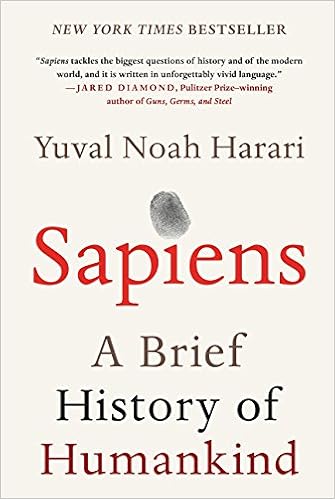I had a hard time enjoying this book by Harari, not because it is not good or interesting --- it is very interesting, but the (inevitable) scatteredness irritated me every few pages. The author was overly ambitious and crammed as many ideas as he could into a small space. It's against my temperament to move on, as quickly as the book does, from one thought to another, without an urge to dig deeper and make connections between some of them. This might be the other extreme of Nassim Taleb, who would pound a perfectly good but not very complex idea to death with 200 more pages than necessary. I find them both to be enlightening but often frustrating.
To me it is only viable to take a couple of the ideas and look closer. I was particularly struck by a subsection in Chapter 8 No Justice in History. The author wrote:
At least since the Agricultural Revolution, most human societies have been patriarchal societies that valued men more highly than women. No matter how a society defined "man" and "women", to be a man was always better.
He went on to point out that sociological and biological attempts to explain this phenomenon have failed so far. Not being a student or scholar in gender studies, I cannot determine whether he is right or there are indeed illuminating theories buried in some university's archives.
Nevertheless, January 22, 2017 is a fitting time to reflect on the gender relations in society, isn't it? The forces seem to be coming to a head with the roiling, boiling tension between men and women. Like many human conflicts, this is both rooted in reality, ie, the solid statistics of disproportionately rising rates of unemployment and interrupted education and premature death in men --- and in symbolism. By symbolism I mean the decline of men's social identity and status that are unmeasurable and psychological. For example, having a male president does not materially change the position of a poor, unemployed man, but it can nevertheless make him feel good.
There are various theories trying to untangle the relations between groups of people in a society. I can't help but feel that the relations between men and women are the most poorly examined and poorly understood element in our understanding of ourselves. Perhaps we are just too biased --- meaning that we are too emotionally invested in some ideas over cold, objective, impartial observation that we employ on, say, astronomy. It seems hopeless.
And yet, the conflicts are real and intractable. I am reminded of a novelette by James Tiptree (who in fact was Alice Sheldon) about a strange species of aliens. The diploid half of the species is intent on hunting down and killing the haploid half. And yet, their own birth and existence depend on each other. Without the haploid, the diploid could not exist and vice versa. It was not obvious, but I understood it was a story, like all sci fi or fantasy stories, about ourselves, in particular about the relations between men and women. Of course men do not literally kill women, but there is the need to dominate and restrict and alienate them. I do not condemn this need --- herein lies the difficulty, as it is such an emotionally charged subject --- but rather wonder whether it is possible to understand it. What if this is necessary? What if there is a reason for patriarchy?
This is extremely difficult, not only because of the perhaps insurmountable separation in perspective, but also the effect and demand of civilization on the masculine instinct utterly unconfined 12,000 years ago.


No comments:
Post a Comment